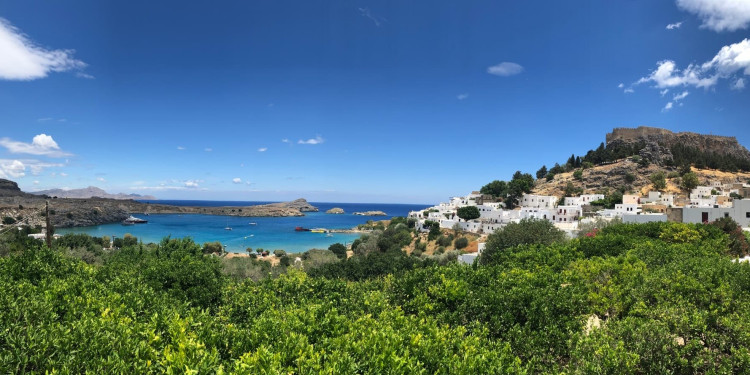
A recent study from the University of Aberdeen and ISATEC Germany shows how to reduce carbon footprint in popular tourist locations
August 4, 2022
The words tourism and sustainability are not often associated with each other, however, a recent study shows that there is actually at least one way to make tourism more sustainable.
Zara Mulholland, an MSc student from the University of Aberdeen’s School of Biological Sciences, co-authored the study with Professor Frithjof Kuepper from the University of Aberdeen and Dr. Martin Spiller, from ISATEC Germany.
The study was carried out in a hotel in the very popular Rhodes in the Greek Dodecanese islands. It showed that if local hotels would phase out fossil fuels and choose renewable energy sources like solar panels or wind turbines, this would be a win-win both for the environment and the hotels.
The common belief is that “tourism is hard to decarbonize” and “renewables are too expensive” but this study shows the exact opposite and tourism could actually become more sustainable thanks to renewable energy.
By using new numerical modeling for electric energy consumption and production, the analysis shows there will be huge cost benefits for the Mediterranean economy if hotels were to use their own renewable energy sources particularly when the price of imported energy from fossil fuels is at an all-time high because of the current conflict in Ukraine.

By applying a net metering system at Kolymbia Bay Art Hotel in Rhodes island, it was found that the carbon emissions associated with its energy system could be reduced by more than 30%.
Relying less on fossil fuels could also bring other benefits: having access to own renewables in the summer could be more reliable and better for health. During the heatwave of 2021 loss of electricity for cooling due to power outages as a result of high demand on the system presented one of the biggest risks to human health demonstrating the importance of creating self-sustaining energy systems such as renewables.
According to Zara Mulholland: “Hotels in the Mediterranean generate much of the region’s revenue with tourism accounting for approximately 18% of Greece’s GDP and employing more than 900,000 people. If the findings of this study are implemented on a large scale, countries like Greece will reduce their carbon footprint as well as their dependence on imported fossil energy and its associated high cost.”
Professor Frithjof Kuepper said: “We anticipate that the owners of Kolymbia Bay Art Hotel, who kindly helped us with this study, will implement the conclusions and recommendations of our findings in the next year. Moreover, we certainly hope that this will be copied many times in Greece and the Mediterranean region.”
Dr. Martin Spiller added: “With Rhodes being one of the most popular tourist destinations in Europe, reducing carbon emissions from hotels is essential for a sustainable future for the Mediterranean region. During the peak holiday period demand for electricity in Rhodes doubles causing carbon emissions to increase.”

There is huge potential for renewable energy production in the Mediterranean basin, particularly solar and wind, providing opportunities to cover part or all energy requirements from hotels and make tourism more sustainable.
Subscribe to our newsletter.
With an increase in the use of renewable energy sources comes a vast carbon reduction potential which would be highly beneficial for mitigating climate change. With the cost of fossil fuel energy only increasing, renewable energy sources may be even more cost-effective than previously thought.
This article was originally published on IMPAKTER. Read the original article.



